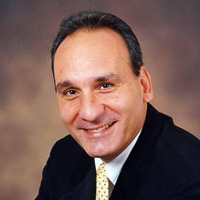Even Responsible Savers Make Retirement Mistakes
You've already done the hard work to stash away a nice nest egg for retirement. Don't blow it now. Here are four common missteps that people entering retirement should avoid.

Profit and prosper with the best of Kiplinger's advice on investing, taxes, retirement, personal finance and much more. Delivered daily. Enter your email in the box and click Sign Me Up.
You are now subscribed
Your newsletter sign-up was successful
Want to add more newsletters?

Delivered daily
Kiplinger Today
Profit and prosper with the best of Kiplinger's advice on investing, taxes, retirement, personal finance and much more delivered daily. Smart money moves start here.

Sent five days a week
Kiplinger A Step Ahead
Get practical help to make better financial decisions in your everyday life, from spending to savings on top deals.

Delivered daily
Kiplinger Closing Bell
Get today's biggest financial and investing headlines delivered to your inbox every day the U.S. stock market is open.

Sent twice a week
Kiplinger Adviser Intel
Financial pros across the country share best practices and fresh tactics to preserve and grow your wealth.

Delivered weekly
Kiplinger Tax Tips
Trim your federal and state tax bills with practical tax-planning and tax-cutting strategies.

Sent twice a week
Kiplinger Retirement Tips
Your twice-a-week guide to planning and enjoying a financially secure and richly rewarding retirement

Sent bimonthly.
Kiplinger Adviser Angle
Insights for advisers, wealth managers and other financial professionals.

Sent twice a week
Kiplinger Investing Weekly
Your twice-a-week roundup of promising stocks, funds, companies and industries you should consider, ones you should avoid, and why.

Sent weekly for six weeks
Kiplinger Invest for Retirement
Your step-by-step six-part series on how to invest for retirement, from devising a successful strategy to exactly which investments to choose.
There actually are people out there diligently saving for retirement.
Yes, you read that correctly. It may not seem like it, given the media’s constant focus on Baby Boomers’ shaky financial future. But there are pre-retirees who have been putting away money for decades in preparation for a long and happy retirement.
If you’re in that group, good for you.
From just $107.88 $24.99 for Kiplinger Personal Finance
Become a smarter, better informed investor. Subscribe from just $107.88 $24.99, plus get up to 4 Special Issues

Sign up for Kiplinger’s Free Newsletters
Profit and prosper with the best of expert advice on investing, taxes, retirement, personal finance and more - straight to your e-mail.
Profit and prosper with the best of expert advice - straight to your e-mail.
But even people who have been responsible with their money can run into challenges when they enter retirement. It requires a monumental shift in your mindset, and it’s easy to make mistakes.
Here are four missteps that even skillful savers need to learn to avoid:
1. Don’t become too enamored with cash.
I often find that people who are naturally gifted at saving money have far too much sitting in cash. And I understand that. Many fear investing in the market because of previous tumbles. In the last 16 years, we’ve had two major drops, and that puts people on edge.
It’s important to always have some emergency money available, but holding too much cash in your portfolio or in the bank opens you up to inflation risk. As the years pass, you’ll lose purchasing power. And then there’s the issue of taxes. If you keep your money in a taxable savings, money market, brokerage or other cash account, you’ll have an ever-growing tax liability. If safety is a priority, talk to your adviser about alternatives that protect your principal and offer a reasonable rate of return.
2. Don’t take too much risk.
If you’ve been enjoying this long-running bull market, like so many have, it’s likely your risk meter is broken. And again, that makes sense. If you lost money in your 401(k) or IRA back in 2000 or 2008, I’m sure you didn’t like it much, but if you were still working and earning a paycheck, it probably didn’t affect your day-to-day lifestyle. Your expenses were met and you were still contributing to your retirement accounts. But in retirement, you won’t have that paycheck anymore. And because your nest egg must generate income, market volatility can have a much greater impact.
Completely avoiding the markets is not a solution for most retirees — especially if you’re going to keep pace with inflation and retain the opportunity for growth and future income. But saving for retirement and planning for retirement are two different things. It’s important to take a balanced approach between income and growth to help prepare for good and bad economic times.
3. Don’t forget about the tax “time bomb.”
Tax planning should be a part of your decision-making as soon as you begin retirement planning. Believe it or not, taxes don’t end when you retire. Many people think they do — or, at least, they think taxes will be greatly reduced. That’s a myth — especially now, as so many retirees have most of their savings in tax-deferred accounts.
When you withdraw money from those accounts in retirement, you’ll be taxed on your contributions and the account growth. It may not seem like it, but today’s taxes are low compared to what past generations experienced. Do you think you’ll be alive when taxes are higher than they are now? Remember, the federal debt now stands at $20 trillion, and projections suggest that amount will continue to rise. Somebody is going to have to pay that bill.
Unfortunately, tax-deferred accounts are vulnerable to tax hikes. It’s probably a good idea to take advantage of those low rates while you can by working with a certified tax planner to help find ways to get your tax rate closer to zero. Some possibilities to explore include converting part of your traditional IRA each year to a Roth IRA. You’ll owe taxes on the amount converted, but it may be at a lower rate since you’re retired, and the Roth has no required minimum distributions.
4. Don’t neglect to live a little.
Some retirees have trouble remembering what they worked so hard to save for. They had an idea of the life they wanted in retirement, but they worry so much about running out of money, they let that dream go. A comprehensive retirement plan can help you transition from a saving mindset and help give you the confidence to spend on the things you always hoped and dreamed for, and for which you worked so hard to save.
Whether your retirement assets are modest or massive, there are common challenges for all retirees. From day one, you’ll need reliable income streams so you can pay your basic bills. That money will form the foundation for the rest of your retirement — and once that foundation is in place, you can build your lifestyle around it. Lifestyle income is the money you spend for fun, family, travel, adventure, etc. It’s going to fluctuate as the markets traverse their inevitable ups and downs, but it should be part of your plan.
Retirement shouldn’t be a time of worry and stress. It should be a time to relax and enjoy life after years of working. But just saving up a big stash of money isn’t enough to guarantee success. A plan that addresses current and future needs will help keep you on track and help you reach your retirement goals.
Kim Franke-Folstad contributed to this article.
Investment advisory services offered through Brookstone Capital Management, LLC (BCM), a registered investment advisor. BCM and Carolina Retirement Resources are independent of each other.
Investing involves risk, including the potential loss of principal. Any references to protection benefits or safety generally refer to fixed insurance products, never securities or investment products. Insurance and annuity product guarantees are backed by the financial strength and claims-paying ability of the issuing insurance company.
Profit and prosper with the best of Kiplinger's advice on investing, taxes, retirement, personal finance and much more. Delivered daily. Enter your email in the box and click Sign Me Up.

Dr. Richard Pucciarelli is the president and founder of Carolina Retirement Resources Inc. He has over 15 years experience serving retirees and pre-retirees in planning for and protecting their financial futures. Pucciarelli is an Investment Adviser Representative and a licensed insurance professional. He hosts the "Financial Symphony" show on WBT Radio 1110 AM every Saturday morning at 11 a.m.
-
 5 Vince Lombardi Quotes Retirees Should Live By
5 Vince Lombardi Quotes Retirees Should Live ByThe iconic football coach's philosophy can help retirees win at the game of life.
-
 The $200,000 Olympic 'Pension' is a Retirement Game-Changer for Team USA
The $200,000 Olympic 'Pension' is a Retirement Game-Changer for Team USAThe donation by financier Ross Stevens is meant to be a "retirement program" for Team USA Olympic and Paralympic athletes.
-
 10 Cheapest Places to Live in Colorado
10 Cheapest Places to Live in ColoradoProperty Tax Looking for a cozy cabin near the slopes? These Colorado counties combine reasonable house prices with the state's lowest property tax bills.
-
 Don't Bury Your Kids in Taxes: How to Position Your Investments to Help Create More Wealth for Them
Don't Bury Your Kids in Taxes: How to Position Your Investments to Help Create More Wealth for ThemTo minimize your heirs' tax burden, focus on aligning your investment account types and assets with your estate plan, and pay attention to the impact of RMDs.
-
 Are You 'Too Old' to Benefit From an Annuity?
Are You 'Too Old' to Benefit From an Annuity?Probably not, even if you're in your 70s or 80s, but it depends on your circumstances and the kind of annuity you're considering.
-
 In Your 50s and Seeing Retirement in the Distance? What You Do Now Can Make a Significant Impact
In Your 50s and Seeing Retirement in the Distance? What You Do Now Can Make a Significant ImpactThis is the perfect time to assess whether your retirement planning is on track and determine what steps you need to take if it's not.
-
 Your Retirement Isn't Set in Stone, But It Can Be a Work of Art
Your Retirement Isn't Set in Stone, But It Can Be a Work of ArtSetting and forgetting your retirement plan will make it hard to cope with life's challenges. Instead, consider redrawing and refining your plan as you go.
-
 The Bear Market Protocol: 3 Strategies to Consider in a Down Market
The Bear Market Protocol: 3 Strategies to Consider in a Down MarketThe Bear Market Protocol: 3 Strategies for a Down Market From buying the dip to strategic Roth conversions, there are several ways to use a bear market to your advantage — once you get over the fear factor.
-
 For the 2% Club, the Guardrails Approach and the 4% Rule Do Not Work: Here's What Works Instead
For the 2% Club, the Guardrails Approach and the 4% Rule Do Not Work: Here's What Works InsteadFor retirees with a pension, traditional withdrawal rules could be too restrictive. You need a tailored income plan that is much more flexible and realistic.
-
 Retiring Next Year? Now Is the Time to Start Designing What Your Retirement Will Look Like
Retiring Next Year? Now Is the Time to Start Designing What Your Retirement Will Look LikeThis is when you should be shifting your focus from growing your portfolio to designing an income and tax strategy that aligns your resources with your purpose.
-
 I'm a Financial Planner: This Layered Approach for Your Retirement Money Can Help Lower Your Stress
I'm a Financial Planner: This Layered Approach for Your Retirement Money Can Help Lower Your StressTo be confident about retirement, consider building a safety net by dividing assets into distinct layers and establishing a regular review process. Here's how.
